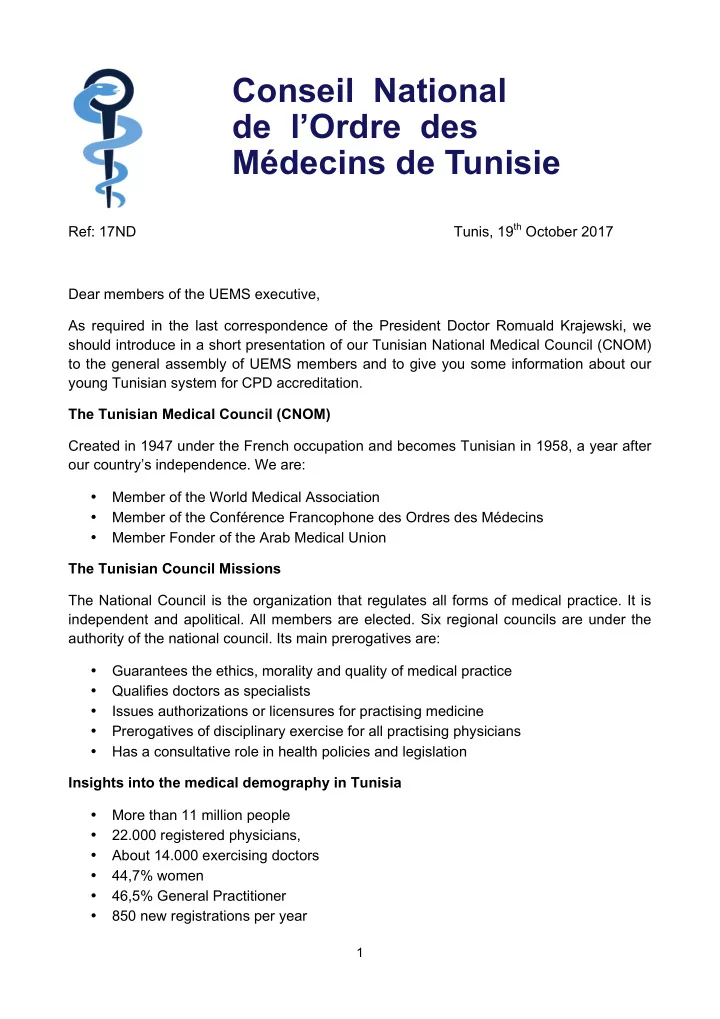

Conseil National de l’Ordre des Médecins de Tunisie ¡ Tunis, 19 th October 2017 Ref: 17ND Dear members of the UEMS executive, As required in the last correspondence of the President Doctor Romuald Krajewski, we should introduce in a short presentation of our Tunisian National Medical Council (CNOM) to the general assembly of UEMS members and to give you some information about our young Tunisian system for CPD accreditation. The Tunisian Medical Council (CNOM) Created in 1947 under the French occupation and becomes Tunisian in 1958, a year after our country’s independence. We are: • Member of the World Medical Association • Member of the Conférence Francophone des Ordres des Médecins • Member Fonder of the Arab Medical Union The Tunisian Council Missions The National Council is the organization that regulates all forms of medical practice. It is independent and apolitical. All members are elected. Six regional councils are under the authority of the national council. Its main prerogatives are: • Guarantees the ethics, morality and quality of medical practice • Qualifies doctors as specialists • Issues authorizations or licensures for practising medicine • Prerogatives of disciplinary exercise for all practising physicians • Has a consultative role in health policies and legislation Insights into the medical demography in Tunisia • More than 11 million people • 22.000 registered physicians, • About 14.000 exercising doctors • 44,7% women • 46,5% General Practitioner • 850 new registrations per year 1
Quality of healthcare in Tunisia • 4 medical schools, 1 dental surgery school and 1 pharmacy school • Good medical training • Good health indicator compared to African countries • Good reputation of Tunisian physicians despite the absence of any evaluation • Tunisian physicians are working in several European countries Continuing Medical Education and Continuing Professional Development The concept of CPD is new in Tunisia and appeared clearly in official texts in 2012. CME is in a large part provided by scientific and learned societies with the financial support of the pharmaceutical industry. But the need of sponsor doesn’t often meet the needs of doctors and learned societies. This is why we have to organise CME-CPD activities. Local experience for accreditation The first step for accrediting CME activities in Tunisia was experienced by the regional council of Sousse, in 2013. It used international criteria and involved several regional CME providers. The council reviews applications according to quality criteria and decides of the number of credits allowed for each activity. In 2014 the Tunisian government creates the "Instance Nationale d'Accréditation en Santé" (INAS). The main mission of INAS is to accredit health structures and to prepare various guidelines and manuals. In 2015 a draft of guide and manual of CPD accreditation is prepared and tested by the Sousse regional council. The criteria were inspired from European and International standards. The one hour-credit system was adopted and the unity was defined as a UDPC (Unité de DPC) The new step for accreditation systems After 3 years of local experience in accreditation, many problems were encountered and we are working with Physicians and CPD providers to find a solution. In 2016, the National Medical Council decided to create a commission named CPD and Competencies Commission with the mission of accrediting medical CPD activities and to prepare a framework for physician certification. This is why we have searching international collaboration in accreditation systems. Our project implementation We project to have 6 Regionals and 1 National CPDCC. Our process was designed to be feasible and easy. The CPD provider may request for accreditation of a specific CPD activity directly to the regional council or by using the online form, email or normal mailing. 2
• If the decision is positive the CPD provider is allowed to mention it in his different documents with corresponding number of hours-credits (UDPC). • All negative decision must be explained and in order to ameliorate quality the Commission can give remarks to the provider CPD. Who its self can appeal this decision to the National CPDCC. Mutual recognition and consideration A mutual recognition of credits between our two structures will be highly valuable for European and Tunisian physicians. We hope that mutual recognition will boost our program in the field of CME/CPD quality and in the near future facilitate the setting up of a certification system based on specialist boards. Conclusion We aim to establish a good and strong collaboration between our Commission of Development Professional Continue and Competences (CDPCC) and the European Union of Medical Specialists and its European Accreditation Council for CME. Today, I’m very honored to be here to express to you the wish of our Tunisian National Council to become an observer member of the UEMS. Dr. Mounir Youssef MAKNI President of the Conseil National de l’Ordre des Médecins de Tunisie 3
Recommend
More recommend